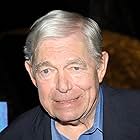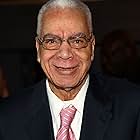Keith Darby
- Self - Narrator
- (voice)
Francis Edwards
- Self - Jesuit archivist
- (as Fr Francis Edwards SJ)
Paul H. Nitze
- Self - Diplomat, Johns Hopkins University
- (as Paul Nitze)
Featured review
This is a panel discussion hosted by William F. Buckley from the early 90s in which scholars and people of the theater debate the issue of the authorship of the Shakespeare canon. Both sides are forcefully represented, most prominently by Professors David Bevington (University of Chicago) and Gary Taylor (Brandeis University) on the Stratford side and Charles Vere (Earl of Buford) and Deborah Bacon (University of Michigan) on the Oxford side. The discussion is interspersed with video clips of various participants including actors Earle Hyman and Charles Boyle and Oxford scholar Roger Stritmatter who liven up the proceedings quite a bit. This is a good place to start for those unfamiliar with the issues and some good points are made on both sides but it is, on the whole, a rather tepid affair.
The discussion goes along familiar lines. The Oxfordians point to biographical connections in the plays and sonnets, the Stratfordians say that they are not very convincing. The Stratfordians point to their man being noted by contemporary sources, the Oxfordians point out anomalies in these citings. The Oxfordians claim the plays were written by an aristocrat, the Stratfordians stand up for the common man. The most telling points for the Oxford side came from Charles Boyle discussing the sonnets and Roger Stritmatter showing how one quarter of the words or phrases underlined in the Geneva Bible owned by Oxford were directly relevant to Shakespeare's plays.
Although the discussion took place fifteen years ago, it seems that the issue hasn't moved very much during the years. A friend recently called my attention to a quote from Dean Radin in his book The Conscious Universe in which he makes a very funny and enlightening observation at the beginning the book. "In science, the acceptance of new ideas follows a predictable four-stage sequence. In Stage 1, skeptics confidently proclaim that the idea is impossible because it violates the Laws of Science. In Stage 2, skeptics reluctantly concede that the idea is possible but that they are not very interesting and the claimed effects are extremely weak. Stage 3 begins when the mainstream realizes that not only are the ideas important but that the effects are much stronger and more persuasive than previously imagined. Stage 4 is achieved when the same critics who previously disavowed any interest in the idea begin to proclaim that they thought of it first." In the Shakespeare Authorship debate, I think right now we are at the end of Stage 2 moving into Stage 3. Stage 4 is still a ways away.
The discussion goes along familiar lines. The Oxfordians point to biographical connections in the plays and sonnets, the Stratfordians say that they are not very convincing. The Stratfordians point to their man being noted by contemporary sources, the Oxfordians point out anomalies in these citings. The Oxfordians claim the plays were written by an aristocrat, the Stratfordians stand up for the common man. The most telling points for the Oxford side came from Charles Boyle discussing the sonnets and Roger Stritmatter showing how one quarter of the words or phrases underlined in the Geneva Bible owned by Oxford were directly relevant to Shakespeare's plays.
Although the discussion took place fifteen years ago, it seems that the issue hasn't moved very much during the years. A friend recently called my attention to a quote from Dean Radin in his book The Conscious Universe in which he makes a very funny and enlightening observation at the beginning the book. "In science, the acceptance of new ideas follows a predictable four-stage sequence. In Stage 1, skeptics confidently proclaim that the idea is impossible because it violates the Laws of Science. In Stage 2, skeptics reluctantly concede that the idea is possible but that they are not very interesting and the claimed effects are extremely weak. Stage 3 begins when the mainstream realizes that not only are the ideas important but that the effects are much stronger and more persuasive than previously imagined. Stage 4 is achieved when the same critics who previously disavowed any interest in the idea begin to proclaim that they thought of it first." In the Shakespeare Authorship debate, I think right now we are at the end of Stage 2 moving into Stage 3. Stage 4 is still a ways away.
- howard.schumann
- Mar 13, 2005
- Permalink
Photos
Storyline
Did you know
- ConnectionsReferences Henry V (1944)
Details
- Release date
- Country of origin
- Language
- Also known as
- Uncovering Shakespeare: An Update
- See more company credits at IMDbPro
- Runtime3 hours
- Color
Contribute to this page
Suggest an edit or add missing content

Top Gap
By what name was Who Wrote Shakespeare's Works? (1992) officially released in India in English?
Answer



